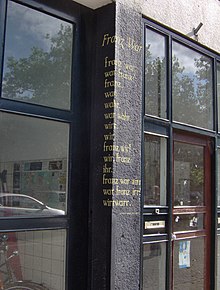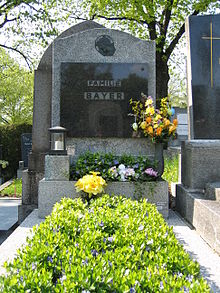Konrad Bayer

franz was.
was french?
french
was.
true.
was true.
confused.
we.
franz we!
we franz.
her.
Franz was confused.
was franz mad?
confused warrior .
Konrad Bayer (born December 17, 1932 in Vienna ; † October 10, 1964 there ) was an Austrian writer and dandy .
Life
In conservative post-war Austria , Bayer tried to tie in with the literary avant-garde and to revive it. As in Germany after the Second World War ( post-war period ), there was a climate of uncertainty in Austria about which literature should be read at all, after large parts of the literature were considered degenerate under National Socialism , and in some cases simply disappeared, and on the other hand the im Avoided literature propagated by National Socialism. Classical literature was preferred, as this seemed the safest to be safe .
Avant-garde literature, as written by Konrad Bayer, was therefore enormously provocative. The provocation was programmatic; the avant-garde and experimental approach to literature and language consisted of an attempt to break linguistic routines, to uncover linguistically conveyed ideologisms and even to free the consciousness from thinking habits in this way.
Bayer was friends with writers like Oswald Wiener , Gerhard Rühm , HC Artmann and Friedrich Achleitner , whom he had met in the Art Club from 1951 . From 1954 to 1960 they formed the Vienna Group . Above all, the Art Club was the podium for various happenings in which - mostly without a previously agreed program - the very Dadaist focus was primarily on provoking the audience. Accordingly, the events often turned into scandals, in which the police often intervened. Friendship and musical interests connected him with the composer Gerhard Lampersberg , with whom he also published the literary magazine "edition 62" (2 issues appeared).
In a lot of collaborative work with these like-minded authors, Bayer produced poetry, literary montages and Dadaist nonsense texts that today seem especially funny and that are intellectual enjoyment to read. Behind the fragmentation of his prose and his worldview is the desire to discover a new, magical context in reality.
In October 1963 Bayer read from the sixth sense in the Swabian Saulgau in front of the group 47 , who were amazed and perhaps too exuberantly praised (“a new cosmology!”) For the reaction to fail to materialize (“cabaret!”). Heinrich Maria Ledig-Rowohlt was so enthusiastic about Bayer's text that he immediately offered him a contract for his next novel.
In 1964, Konrad Bayer often stayed with Padhi Frieberger at Hagenberg Castle in the Weinviertel, together with other members of the Vienna group and the Art Club. Here he tried to complete his novel the sixth sense . This autobiographical work with many references to Hagenberg Castle remained unfinished. The sixth sense only appeared as a fragment in 1966: Bayer, like the protagonist of the novel, had committed suicide: “When goldenberg was back in his room, he opened both taps, closed the window and made himself comfortable on the sofa smell wasn't unpleasant and he was waiting for sleep. "
Konrad Bayer committed suicide on October 10, 1964.
Ida von Szigethy describes the last evening together in her book:
“[...] On October 9, 1964, we had an appointment with him in a Viennese schnapps bar. Konrad complained to me about stomach cramps, he was in a rather depressed mood. From there, at his request, we drove to Café Hawelka, where we met all friends as always. Peter Daimler invited us all to his house in Hietzing. The Beatles records were played, 'A Hard Day's Night', the same over and over again, some dancing. Konrad sat on the floor, his head in a lady's lap, and watched the whole scene without taking part. Ferry and I drove home around 2am. [...] "
It rests in an honorary grave in the Hernalser Friedhof (group 67, row 10, number 11) in Vienna.
reception
Ernst Bloch described Bayer's texts at a reading by Group 47 as impressive and philosophical. They showed a homelessness, but also wit. Oswald Wiener also attributed the effect of his texts to his charismatic personality. At the center of the Requiem for a Young Poet by Bernd Alois Zimmermann are the verses of Konrad Bayer:
- hope for / there is nothing that can be achieved except death.
Works
- the philosopher's stone (tract), 1963, Berlin, ISBN 978-3-87352-007-3 .
- the sixth sense (unfinished novel)
- the head of vitus bering (montage of the novel)
- shit and brunzen ( lyric )
- kasperl on the electric chair ( play )
- edition 62. Issues 1 and 2. Maria Saal, Vienna 1962. Ed. by K. Bayer and G. Lampersberg. (Literary magazine)
Sound recordings
- Konrad Bayer: the sixth sense. Original sound recordings 1962–1964 , ed. v. Klaus Sander. 2 CD set, 110 minutes. Cologne: supposé 2002. ISBN 3-932513-32-0 .
- Konrad Bayer / Gerhard Rühm: joint work 1957–1962 . Audio CD, 70 minutes. Speaker: Gerhard Rühm. Cologne: supposé 2002. ISBN 3-932513-33-9 .
- The Worried Men Skiffle Group has set some lyrics to music and recorded them as records, including "Glaubst i am bled" (Do you think I'm stupid)
Plays
- dialogues:
- either: move back again or: visage-a-visage in the tram
- an adventure of the lion of belfort
- the man in the Moon. Napoleon or who knows?
- (david) kean from the london shakespeare theater in his starring role of the king non plus ultra
- adventure in space
- the birds
- the lake (1)
- the lake (2)
- discourse on hope
- good Morning
- January 17th, 1962
- x-th number (singspiel)
- 300 people
- une show royale (scenario)
- the terrible comedy of the good lukas (scenario and fragments)
- the pawnshop
- the lion at belfort (fragment)
- qui & qua. drama in five acts (fragment)
- the dead child in the cradle
- mr tanaka
- speechless sentences
First performance of most of the dialogues as part of the first and second cabaret of the Viennese group on December 6, 1958 and April 15, 1959
-
the talented spectators
- U: Student stage “Die Arche” Vienna, 1961
-
groom & anonymous
- U: studio experiment am lichtenwerd Vienna, 1963
-
kasperl on the electric chair
- U: Wiener Festwochen, 1968
-
the analfabet
- U: Landestheater Darmstadt, 1969
-
the mountain
- U: Landestheater Darmstadt, 1969
-
the boxers
- U: Theater am Neumarkt Zurich, 1971
-
idiot
- U: Schiller Theater Berlin, 1972
-
the pawnshop
- U: Theater im Altstadthof Nuremberg, 1988
Together with Gerhard Rühm
-
cosmology
- U: Student stage “Die Arche” Vienna, 1961
-
The Flying Dutchman
- U: Student stage “Die Arche” Vienna, 1961
-
they become a mystery to me, my father
- U: Vienna Action Theater, 1968
-
the welding foot
- U: Volkstheater Vienna, 2004
Settings
- Erik Janson (* 1967): mit gekreisch (2008) for soprano, Eb clarinet / bass clarinet and violoncello. WP May 4, 2008 Dortmund (Depot; Irene Kurka [soprano], Joachim Striepens [clarinets], Burkart Zeller [cello])
- 1. alabaster creations - 2. pierrot has lost his foot - 3. with a screeching - 4. whether you also move away - 5. he the day - 6. the landscape
- Worried men skiffle group (1970): Do you think I'm bled?
- Christoph Theiler (* 1959): blue - 444 nanometer (2008) for soprano, clarinet / bass clarinet, accordion, violoncello and live electronics. Premiere May 4th, 2008 Dortmund (Depot; Irene Kurka [soprano], Joachim Striepens [clarinets], Burkart Zeller [violoncello], Maik Hester [accordion])
- 1. above it stood - 2. topology of language
- Ronnie Urini : nobody helps me (1982) for voice and band
- The Requiem for a Young Poet (1965–1969) by Bernd Alois Zimmermann contains Bayer's text: “ask: what hope for?” As a Ricercar .
- Mosaic by Klaus Buhlert assembles texts by Bayer for a 50-minute radio play (with Herbert Fritsch , Bernhard Schütz, Gottfried Breitfuß, Jeanette Spassova and Lars Rudolph), production: HR / DLF 2005.
- "The sixth sense" edited and staged by Leonhard Koppelmann for HR 2005 (with Sophie Rois, Moritz Stöpel and Wolfgang Pregler)
- Konrad Bayer: Chansons (LP Vinyl, nonfoodfactory), set to music by Paul Skrepek, interpreted by Johanna Orsini-Rosenberg and Paul Skrepek.
Movies
Ferry Radax (* 1932) has made three films with, about and by Konrad Bayer.
- Stop sun! (1960) 26 min., Black and white. (DVD 2007)
- Konrad Bayer, or: I am the world and that's my business (1969). 52 min., Black and white
- The head of Vitus Bering (1970), 26 min., Black and white
literature
- U. Janetzki: Alphabet and World About K. Bayer (1982)
- U. Janetzki, W. Ihrig (Ed.): "I am the world" Materials on K. Bayer, in: protocols (1983, Volume 1)
- F. Achleitner and P. Weibel (Eds.): Wiener Gruppe (1997)
- F. Achleitner and W. Fetz (eds.): Wiener Gruppe (exhibition catalog, Kunsthalle Wien, 1998)
- E. de Smedt, N. Wehr (Ed.): Game on life and death. The Resurrection of Konrad Bayer (exercise book 79, 2012)
- Klaus Kastberger: Konrad Bayer and the avant-garde archives
- Thomas Eder (literary scholar) , Klaus Kastberger (ed.): Konrad Bayer. Texts - pictures - sounds . Vienna: Zsolnay 2015. ( ISBN 9783552057456 )
- Wilfried Ihrig : Modern Austrian Literature. Berlin 2019, pp. 81–126.
Web links
- Literature by and about Konrad Bayer in the catalog of the German National Library
- Annotated link collection of the university library of the FU Berlin ( Memento from May 13, 2013 in the Internet Archive ) (Ulrich Goerdten)
- Essay on Konrad Bayer and 'the fragmentation of the whole'
- Konrad Bayer in the literary archive of the Austrian National Library
- Konrad Bayer in the Austrian Lexicon AEIOU
- Konrad Bayer Forum
- konrad bayer society regular organization of readings, performances and performances
supporting documents
- ^ DIE ZEIT (archive): Memory of Konrad Bayer . In: The time . October 23, 1964, ISSN 0044-2070 ( zeit.de [accessed August 30, 2019]).
- ↑ Klett-Cotta :: Complete Works - Konrad Bayer Gerhard Rühm (Ed.). Retrieved August 30, 2019 .
- ^ Book: Konrad Bayer: chère ida. Retrieved August 30, 2019 .
- ^ Klaus Kastberger: Cool and infinitely young. Die Presse, September 12, 2014, accessed on August 29, 2014 .
- ↑ Hope for what ?: In Bernd Alois Zimmermann's “Requiem for a Young Poet”, Tristan and Isolde meet the Beatles, Kurt Schwitters merges with Beethoven . In: Die Zeit , No. 12/2007.
- ^ On the 50th anniversary of the death of Konrad Bayer , Deutschlandfunk
| personal data | |
|---|---|
| SURNAME | Bayer, Konrad |
| BRIEF DESCRIPTION | Austrian writer |
| DATE OF BIRTH | December 17, 1932 |
| PLACE OF BIRTH | Vienna |
| DATE OF DEATH | October 10, 1964 |
| Place of death | Vienna |


